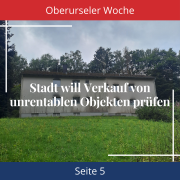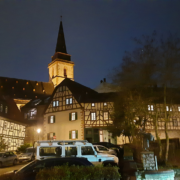 Ever since I started following the proceedings at Oberursel’s town hall more closely, I kept coming across the word “Bebauungsplan”. I knew that it had something to do with planning permission, but I noticed that there were several stages involved and decided to find out more.
Ever since I started following the proceedings at Oberursel’s town hall more closely, I kept coming across the word “Bebauungsplan”. I knew that it had something to do with planning permission, but I noticed that there were several stages involved and decided to find out more.
My previous knowledge about such things probably explains it in the most simple terms. Towns in Germany define Bebauungspläne for particular areas to specify what type of buildings can be built there, eg. residential, commercial or industrial, and the limits that these buildings can have. So there are rules that I have come across in our road on what percentage of a plot of land can be built on and how much floorspace a house can have.
But they can also include details such as areas set aside for recreation, or which type of plants will be used, or where car parking spaces will be.
The whole thing is set down in German building law, § 9 BauGB to be precise.
Once approved the contents of a Bebauungsplan are a good as set in stone. The only way to change it is for the town council to approve the change. It is worth considering that this process probably has to take place before an architect even starts work on any building plans, because it would not make sense to plan a building that the planning office could not approve in the first place.
As an example, let’s look at what happened when Frankfurt International School started looking into their new sports centre. The consultation process with local residents and other interested parties took several months and the solution was finally presented in mid March 2012.
Part of the original Bebauungsplan apparently included additional road access for the campus, something that is now not needed. But it also had a limit to the west of the campus on how far the school could build.
Just getting these two parts of the plan changed involved approval in varying degrees from the town’s administration, the Ausländerbeirat, the building and environment committee, and local district Ortsbeirat (roughly equivalent to a parish council) and finally the town council. This process took just over a month.
With these changes approved, a draft of the new plan was due to be discussed this week back at the building and environment committee, after which environmental factors such as the woodland and water management will come into play and these have to be approved by specific departments or agencies. The current timeframe envisages this to be completed by October 2012.
Only then, and probably at the beginning of 2013, will the plans be made public. Although when building plans are made “public” it means that they can seen by interested parties at the planning office in the town hall, although some are also made available on-line.
And once that has happened, there may be even more steps that I am as yet unaware of. But the final stage is when the plan goes back to the town council for the Satzungsbeschluss – the approval that makes the new Bebauungsplan binding. As I understand it, once that is the case then they can proceed to the next step: the Baugenehmigung for the new building itself.






Speak Your Mind